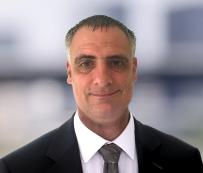Meet Jason Flatt
Peterborough, England, U.K.

Proactive, responsive and present. This mantra defines Jacobs’ defense leadership across Europe, and it’s a fitting introduction to Jason Flatt.
It starts with his energy levels: they’re unwavering and infectious. Coupled with his natural problem-solving mindset and talent for building relationships, this energy has powered his career across high-stakes infrastructure—from hospitals for the National Health Service to military bases supporting global missions.
After delivering key health facilities, Jason transitioned to national defense, joining the U.K. Ministry of Defence and working closely with the U.S. Air Force (USAF) on British soil. Over 17 years, he led projects at RAF Lakenheath, RAF Feltwell and other bases in the U.K., Norway and Iceland. One standout project: Liberty Village, a $240 million housing development.
As his career progressed, Jason rose to become head of projects, leading a team of more than 50 people and managing £1.9 billion in construction. He oversaw major mission beddowns—complex programs that establish new units and assets at bases—including the F-35A Lightning II fighter jet program.
In 2024, Jason joined Jacobs as defence portfolio lead. A clear theme ties his work together: delivering infrastructure that protects lives, assets and reputations.
Get to know Jason
-
35 +
years spent supporting Ipswich Town Football Club
-
20 +
years experience in the defense sector
-
8
million lines of code that underpin the F-35 Lightning II Flight Systems
What are the biggest infrastructure challenges facing national defense clients today?
Our work in the defense sector is growing fast due to rising global tensions and shifting geopolitics. One major challenge is operating under strict security requirements. Some of our projects are so classified that even we aren’t told every detail. This affects scoping, which means we have to be agile and creative in how we deliver to end goals.
Another critical area is cybersecurity. The threat is rising globally across defense estates, but we’re fortunate to have leading experts who help safeguard our projects, especially when collaborating with the United States Air Force (USAF).
We overcome these challenges through strong systems and trusted industry relationships. We work closely with other companies, particularly prime contractors, to boost delivery through alliances and customized models that give us the flexibility and resilience to adapt.
How do you navigate the complex regulatory requirements unique to the defense sector?
Most of my work has been classified, but I can speak to my experience with the USAF in the U.K. Working on U.S. bases leased from the U.K. Ministry of Defence means we must comply with both U.S. and U.K. standards. We usually follow the most robust and demanding requirements.
A good example is the beddown mission for the F-35A fighter jet at RAF Lakenheath, one of my proudest achievements. We delivered several integrated projects worth £350 million—on time and on budget. From the start, we brought together subcontractors, fire departments, environmental agencies and government stakeholders from both countries. Collaboration and regional expertise were key.
We used regular progress checkpoints and program management best practices to stay on track. The project was under tight scrutiny from both governments but was ultimately a major success.
What tools and technology are essential for managing defense projects?
It all depends on the project and client needs — we tailor our approach to suit the purpose. Artificial intelligence is making more of an impact. We’re focusing on using it to drive productivity – but maintaining the strictest security is our priority.
I still believe in the human element though. The fastest way to accelerate delivery is with collaboration, agility and strong leadership. Technology supports our efforts but it’s people who drive results.
That’s why having capable project leaders on site is essential. It’s not just about the tools—it’s about having the right team to act decisively.
What are your biggest lessons for graduates entering this market?
Be a sponge. Learn from your peers and seek mentors in different specialties. Apply their guidance to your own path. Stay curious and be proactive about new opportunities.
If you aren’t working, what are we most likely to find you doing?
Two things come to mind. First, I’m a longtime supporter of Ipswich Town Football Club. My dad took me to Portman Road when I was young and I’ve stuck with them through the ups and (more often) the downs since they were relegated from the Premier League.
Second, I spend my weekends caddying for my 10-year-old son, who competes in golf tournaments. He’s had wins and losses but he loves it—and I love supporting him and keeping it fun.












































